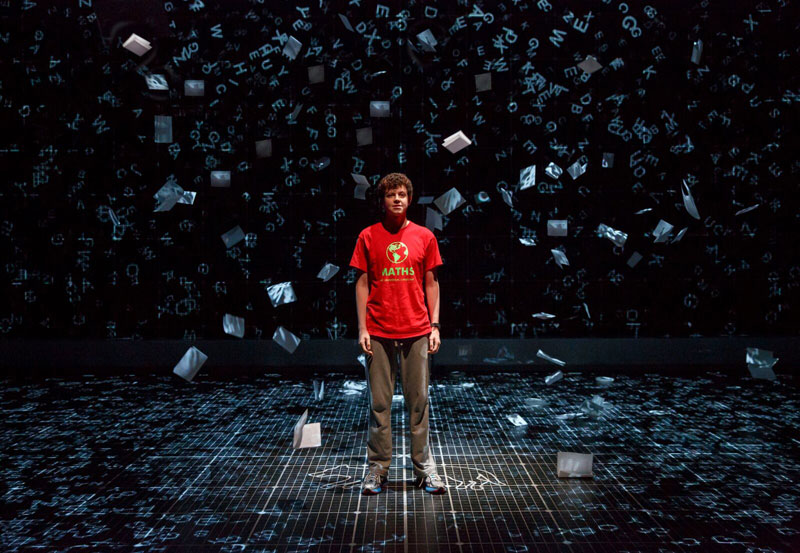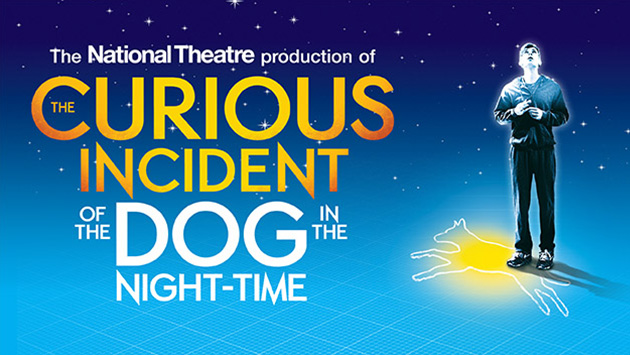
Courtesy
How does anyone stage a play about complicated relationships, a disorder on the autism spectrum and patience, with a dash of mathematics thrown in for good measure? If “The Curious Incident of the Dog in the Night-Time” is our only such example, and I suspect it is, the answer is with noise, lights, inventive stage craft and a little bit of humanity.
“Curious Incident” is the rare play to be presented as part of the Walton Arts Center’s Broadway series, which usually features singalong musicals. But “Curious Incident” is no average play, and the set built for the show is more advanced than many we’ve seen on the WAC stage. It comes to Fayetteville with much acclaim, having won an Outer Critics Award for Outstanding New Broadway Play, a Drama Desk Award for Best New Play and the 2015 Tony Award for Best Play. Its Broadway success follows a successful run in London’s West End, where it debuted in 2012. The first U.S. tour of the play, which includes the run in Fayetteville, launched in September 2016. It remains at the Walton Arts Center through Sunday (April 23) afternoon.
“The Curious Incident” opens, staggeringly, with a clearly dead dog in the middle of the set, just sitting there as patrons file in to the theater waiting for the show to begin. The first character to discover the deceased animal is the protagonist, Christopher, played by Adam Langdon. He loved the animal, named Wellington, and he pets the animal only to be caught doing so by the pet’s owner. Christopher is caught red handed, even though he did not commit the fatal act of violence.
After a brief detention at the local police station, Christopher goes about doing detective work to solve this curious incident. Against his father’s wishes, he ventures out of the house doing this detective work. In the process of going door to door in his own neighborhood, Christopher ends up meeting many people he’d never met before.
We learn as the play literally marches on – “left, right, left, right,” Christopher has to remind himself – that our protagonist has an unnamed disorder on the autism spectrum and a series of behavioral issues tied to that condition. He doesn’t like to be touched, for one, and his reactions to touch get him into trouble quite often. He likes the color red, but not yellow. He is a whiz at math, but can’t process the whirling bustle of a train station with its crowd of busy people.
 What: “The Curious Incident of the Dog in the Night-Time”
What: “The Curious Incident of the Dog in the Night-Time”When: Through April 23
Where: Walton Arts Center, Fayetteville
Cost: $35-$74
Tickets: 479-443-5600 or tickets.waltonartscenter.org
As Christopher investigates the mystery and writes about it in his book, he uncovers several adjacent mysteries about his neighbors and family. He writes his book in secret from his caretaker father, Ed, and from everyone with the exception of Siobhan (played by Maria Elena Ramirez), his instructor at his special school.
As the mystery is slowly revealed to us – and to Christopher as well – over the play’s 2 1/2 hour (including intermission) run time, we learn about the depths of the relationships around him even as Christopher struggles to make connections on his own. Everyone around him is complicated and confusing. Christopher is closest to his father, Ed, played by Gene Gillette. You can hear the utter exasperation in his voice when he tries repeatedly to get Christopher to listen to him. This is the same man who insists, to the point of bribing school officials, that his son could and should take a rigorous math test no one else at his school has been allowed to attempt. Ed, like everyone else, is a complicated character.
Meanwhile, the play is in on its own jokes. The fourth wall is broken on several occasions, and Christopher is stopped from telling a rather complicated solution to a mathematics problem under the idea it would bore the audience. There’s a self-awareness among the production crew that works to make the play active and not lost in its own details. The action is driven in large part by an inventive set with nooks and crannies filled with surprises. The stage is a large, dark box, but one with lights and gadgetry that make it come alive. (P.S. Stick around after the curtain call if you want to hear Christopher talk about the stage’s specific technical capabilities…) To say much more about it would give away some important plot points, but know that the way Christopher uses the stage is half of the fun of the “Curious Incident.”
The stage takes us between houses and train stations and to different cities in England, although the play feels much more universal than its British setting. That brings me to my biggest quibble of the production. It is indeed based off British author Mark Haddon’s novel of the same name, and is set in the same towns, chiefly Swindon and London. But the accents employed in the production left me wondering where we were at some times. I wouldn’t have minded thicker accents. I wouldn’t have minded more veiled ones, if that’s where the director decided to take us. But the middle ground, with a mixture of both, left me wanting.
But the production does take us places. It’s a noisy play, like Christopher’s mind, with bursts of new wave British electronica blasting during the more manic moments. Langdon, as Christopher, gives a very physical effort, reminding me somewhat of a defender in a soccer match – here one minute, there another, going, going, going, never ceasing. Unless he’s at one of his worst, most inward-seeking moments, when he might be found curled up on the floor. One moment he’s yelling and sobbing, and the next he is frantically building a train set. It is a highly choreographed show, despite the lack of song-and-dance numbers.
It is also, like its subject matter, highly complicated. There are reasons to root for many of the characters, and there are reasons to be mad at them, too, sometimes simultaneously. We always cheer for Christopher, however, who always means well even if he doesn’t understand the world around him. On this point, we can all agree with our protagonist, I think. People are confusing.



